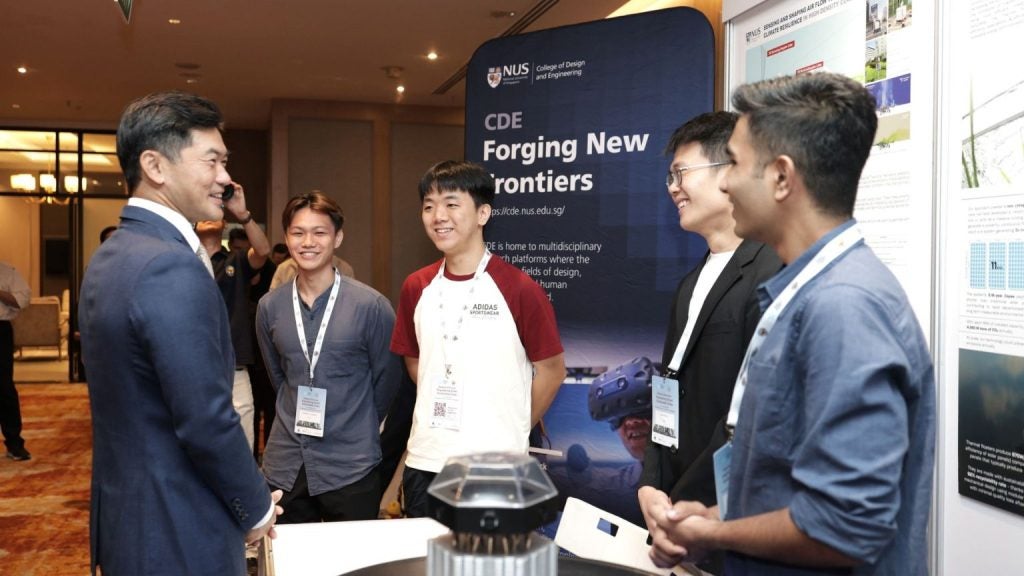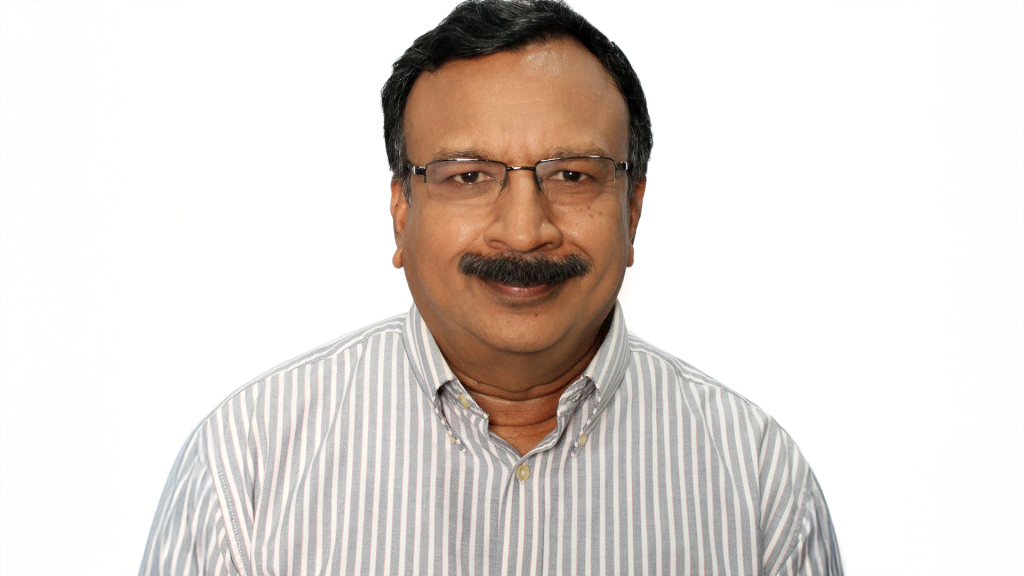CDE faculty joined engineers, policymakers, and industry leaders at the World Engineers Summit (WES) 2025 to share research and ideas on how engineering can shape smart, sustainable cities for the future.
Held from 22 to 24 October 2025 and organised by The Institution of Engineers Singapore (IES), with CDE as a bronze event sponsor, the summit brought together experts from academia, government, and industry to explore solutions for climate resilience, sustainable design, and future-ready engineering education.
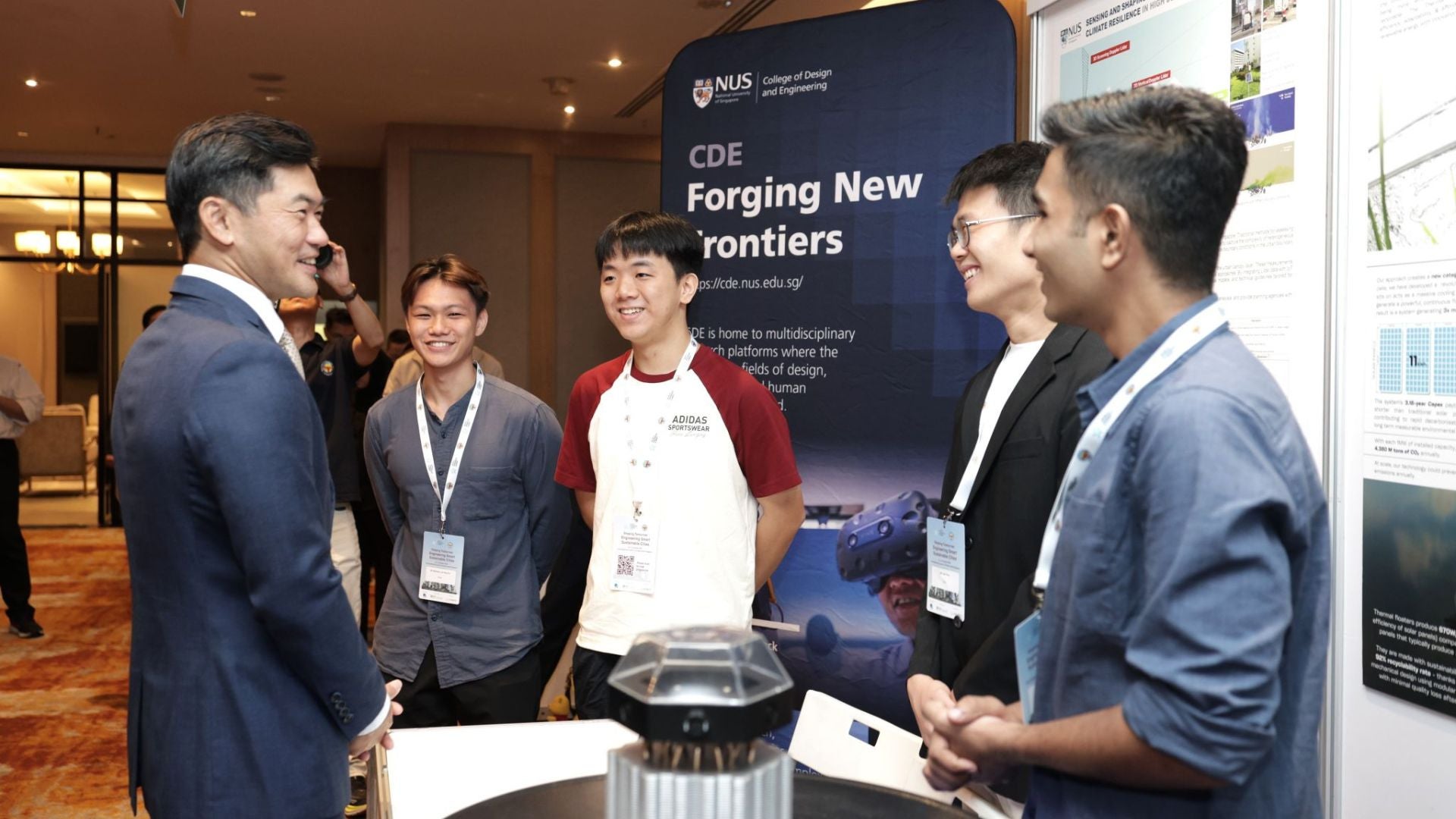
The event was graced by Guest of Honour Mr Desmond Tan, Minister of State for the Prime Minister’s Office and Deputy Secretary-General of the National Trades Union Congress, who commended engineers for their leadership in advancing climate action.
“As engineers, we are problem solvers at heart. We don’t shy away from challenges but confront them head-on,” he said. “Through shared resolve and innovation, we can make a real impact.”
Engineering sustainability and innovation
With the summit theme of Shaping Tomorrow: Engineering Smart Sustainable Cities, CDE faculty showcased research reflecting the College’s commitment to advancing sustainability through innovation and real-world impact.
Speaking in the opening session, Professor Liu Bin, Deputy President (Research and Technology) at NUS, outlined the university’s integrated sustainability framework, highlighting focus areas such as heat resilience, energy, and nature-based solutions, and emphasising the importance of translating research into tangible outcomes for cities.
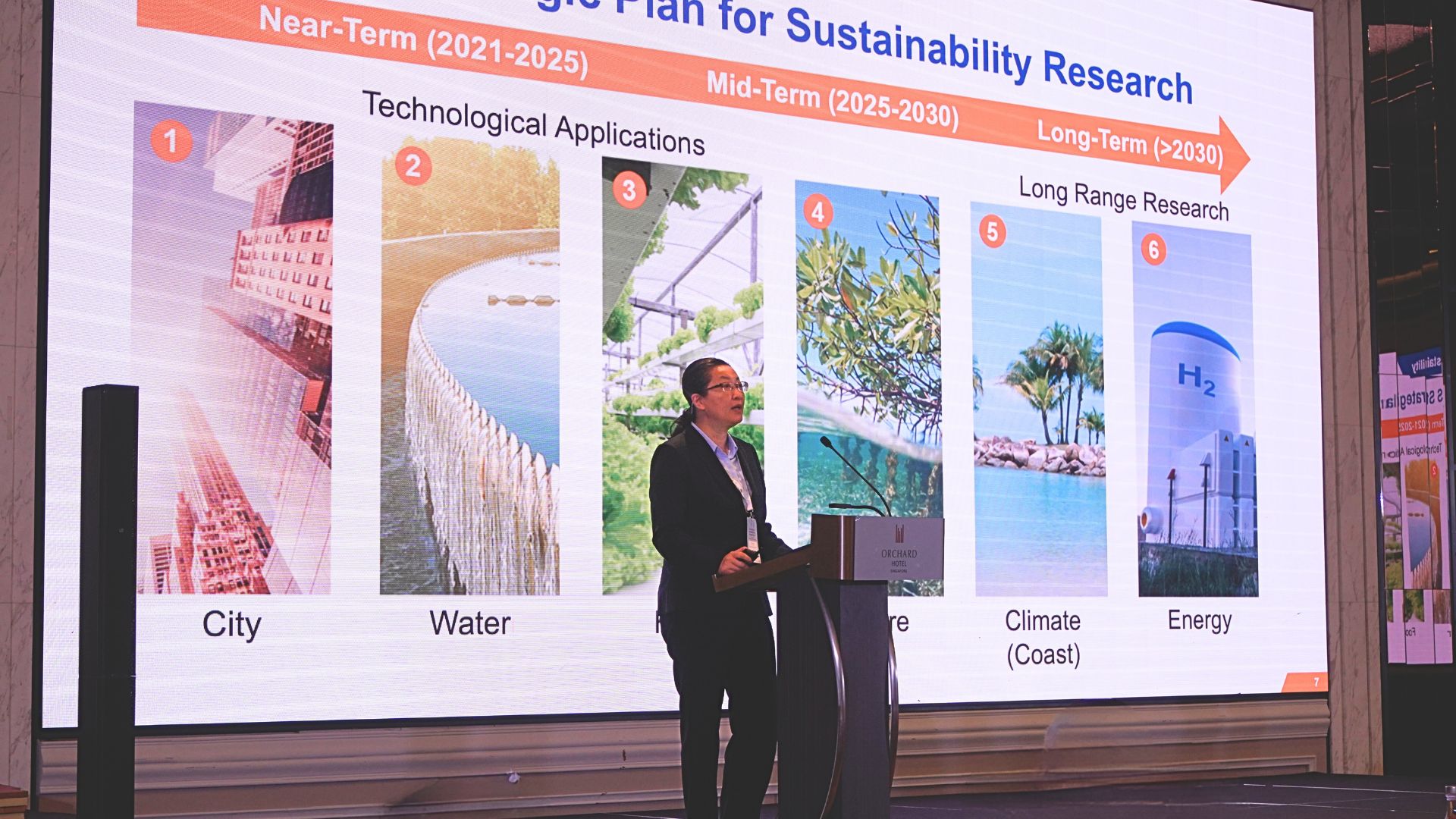
In the subsequent panel discussion moderated by Professor Lee Poh Seng (Head of Dept, Mechanical Engineering), international and local leaders including H.E. Hiroshi Ishikawa, Ambassador of Japan to Singapore; Mr Richard Lim Cherng Yih, Deputy Chairman, Land Transport Authority; Professor Liu Bin; and Mr David Foo, Deputy Chief Executive (Operations and Technology) and Chief Data Officer, Maritime and Port Authority of Singapore examined how engineering, policy, and innovation can converge to deliver sustainable, people-centred urban solutions.
The afternoon session featured presentations by engineering leaders.
Associate Professor Ernest Chua (Mechanical Engineering) delivered a keynote on next-generation air-conditioning and dehumidification systems that eliminate refrigerants and reduce energy use by up to 40 percent, offering new approaches to sustainable urban cooling. He underscored how sustainable cooling innovations can reduce urban heat emissions and support Singapore’s transition toward net-zero buildings.
Assistant Professor Pearl Li (Civil and Environmental Engineering) and team, represented by Dr Lin Xiangfeng, presented a simulation model for floating tidal turbines that improves performance and reliability in marine environments, advancing clean energy solutions for future cities.
Future-proofing engineering education
The summit also spotlighted the future of engineering education and how educators are preparing graduates to thrive in an era defined by digitalisation, automation, and sustainability.
Day two of the event saw educators from CDE present papers and case studies as part of the summit’s Future-Proofing Engineers Through Educational Technology and Skill Development track, showcasing innovative teaching methods, digital learning tools, and industry collaborations that are reshaping how engineering is taught and practiced.
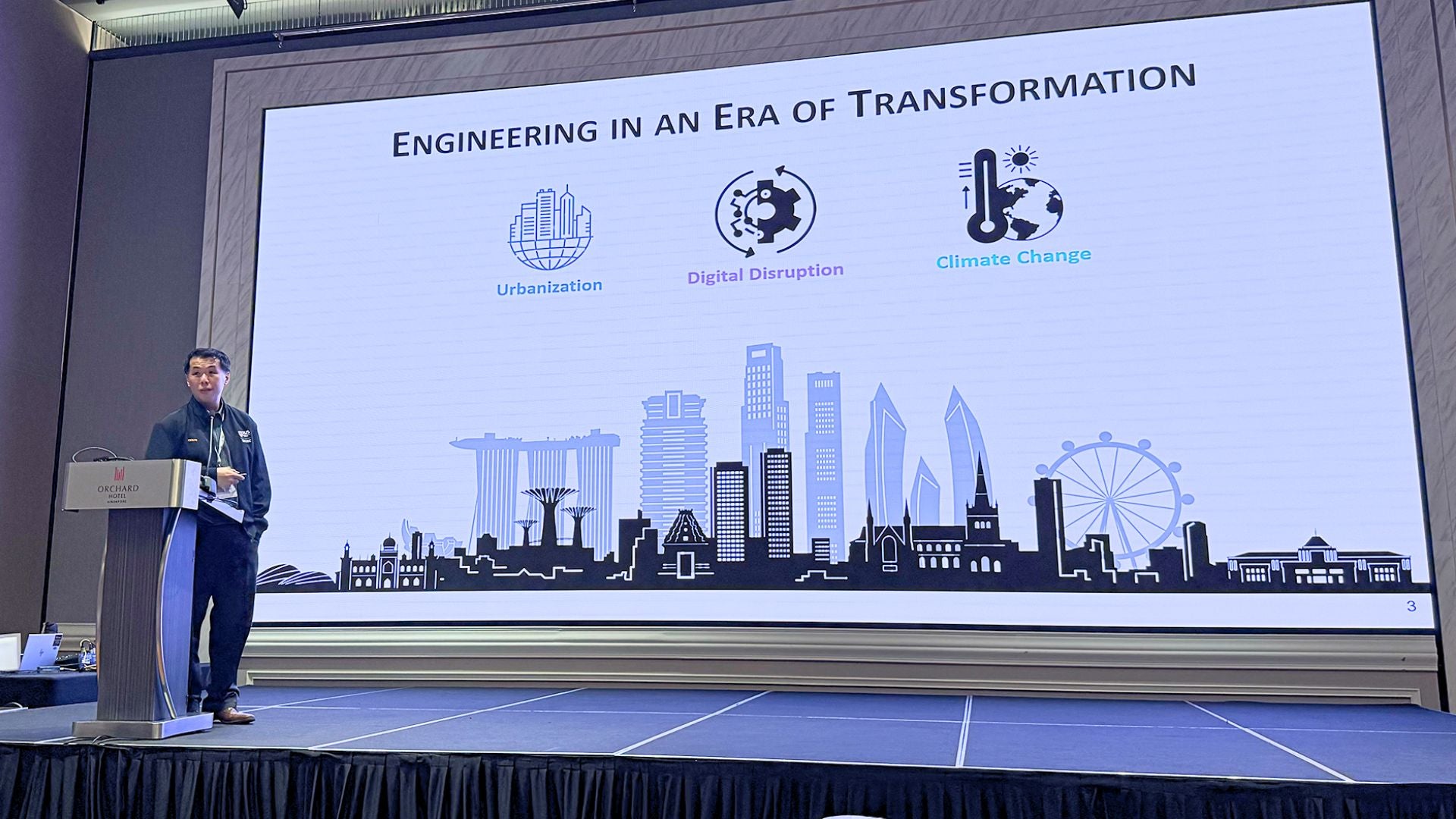
Delivering one of the track's keynotes, Associate Professor Pang Sze Dai (Civil and Environmental Engineering) drew on nearly two decades of experience in academic leadership and curriculum design in a presentation titled Future Proof by Design: Balancing Breadth, Depth, and Industry Relevance in Engineering Education.
Top of what he said are the mega-trends impacting engineering education is the rapid urbanisation taking place around the world, creating demand for engineering talent able to design “resilient, smart and sustainable urban systems”.
“Engineers must bridge the hardware in urbanisation, the software in digital disruption, and the greenware in climate change,” Assoc Prof Pang said.
To meet this challenge, he said it was important to balance developing broad-based knowledge with deep disciplinary expertise, underpinned by key competencies such as digital and AI fluency, sustainability literacy, creative problem-solving, systems thinking, and lifelong learning.
The flexible curriculum at CDE fosters these attributes, Assoc Prof Pang said, through a strong foundation in digitalisation, sustainability, and design thinking, coupled with components that allow students to build disciplinary depth and pursue specialised pathways.
“The new generation of students want to pursue their interests and shape their own learning journeys,” he said. “If the curriculum is too constrained, we risk losing the creativity and agility that industry now demands.”
He also pointed to the College’s AI+X framework, which integrates artificial intelligence into a wide range of disciplines to enhance learning and application across fields ranging from civil and mechanical engineering to environmental systems and materials science.
By embedding AI concepts within domain-specific contexts, students learn to harness data and automation as tools for innovation rather than ends in themselves. This approach, Assoc Prof Pang said, prepares graduates to become “AI-fluent engineers” capable of applying emerging technologies to solve complex, real-world problems.
Concluding his address, Assoc Prof Pang said it was important not to lose sight of the human dimension of engineering education, which is about delivering solutions for a diversity of needs.
“We talk about technology, systems and outcomes, but ultimately education is about people,” he said. “We design the curriculum, but they, the students, will design the future.”
Other papers presented by CDE faculty at the summit reflected the College’s wide-ranging approach to future-proof engineering education.
Topics ranged from embedding sustainability across chemical and built environment programmes, to fostering AI–human collaboration in biomedical engineering and using inquiry-based and digital learning platforms to enhance student engagement and critical thinking.
Faculty also shared insights on project-based learning, simulation tools, and capstone design projects that strengthen connections between academic study and industry practice, highlighting the educational innovation taking place across CDE’s departments.
By integrating technology, sustainability, and human-centred learning, the presentations demonstrated how CDE is developing graduates equipped with both technical expertise and the creativity, curiosity and resilience to address complex challenges and shape a more sustainable future.



